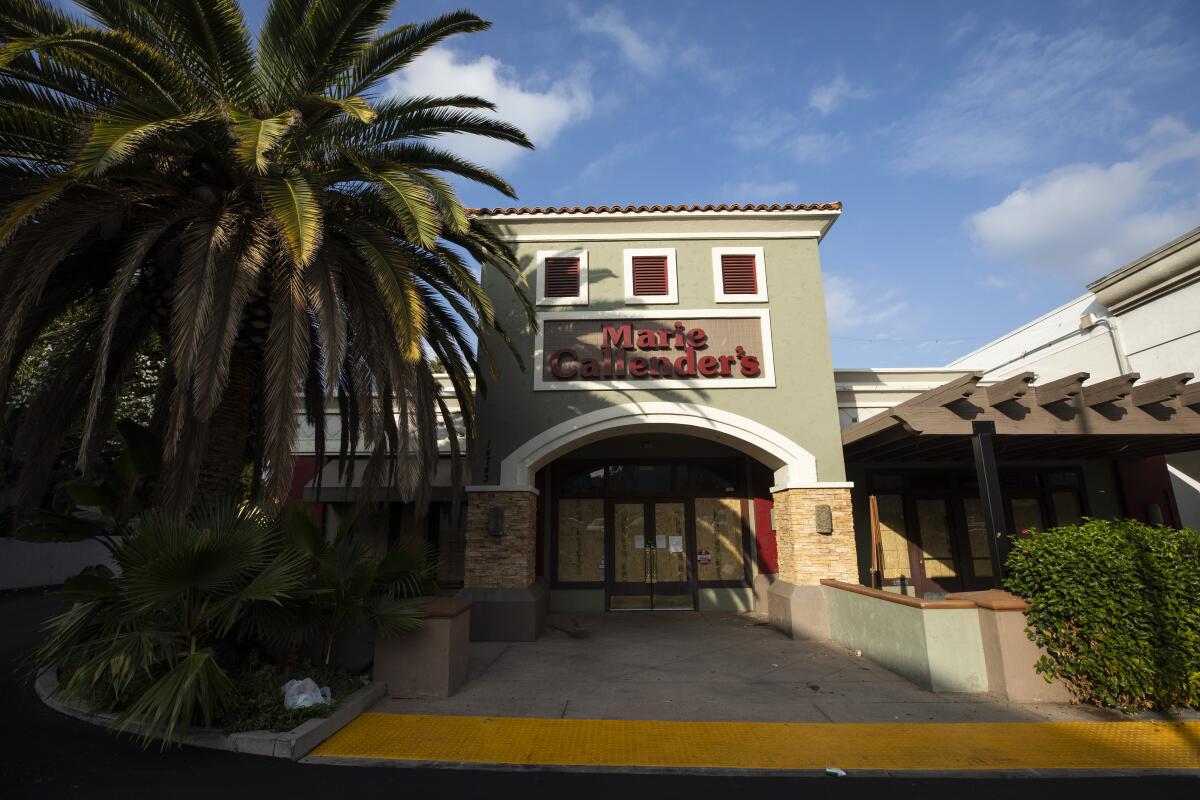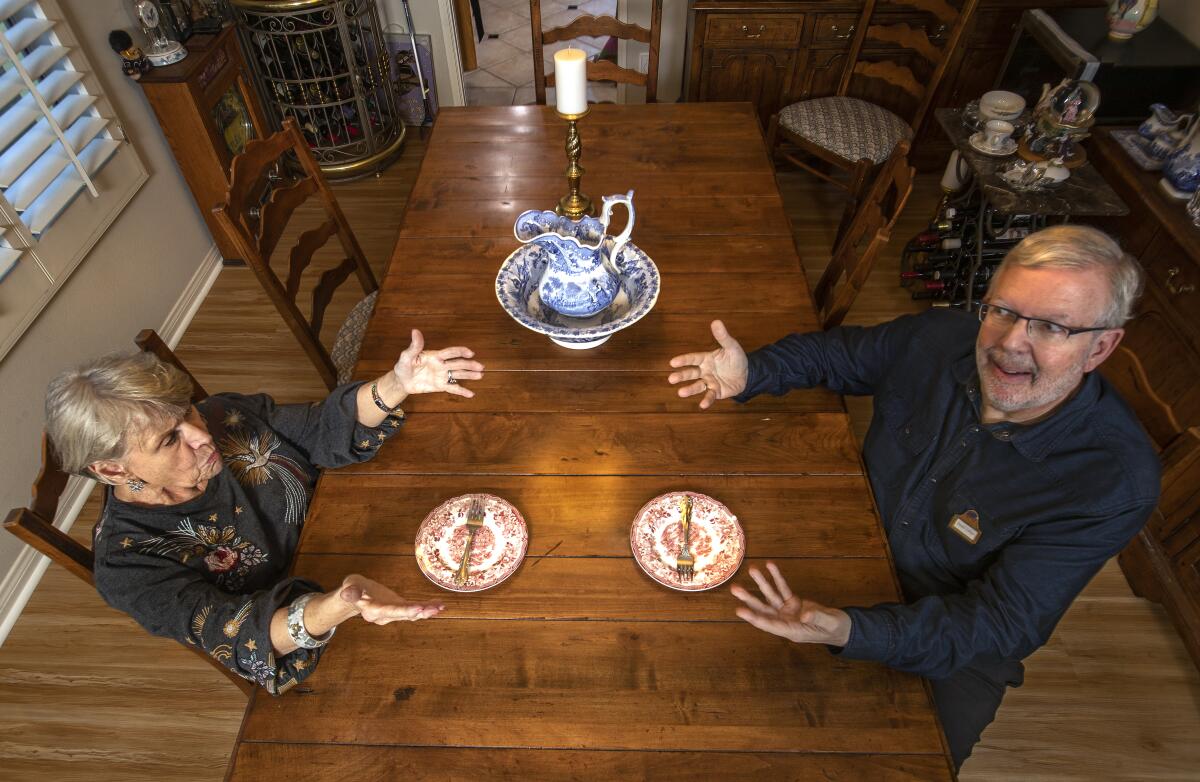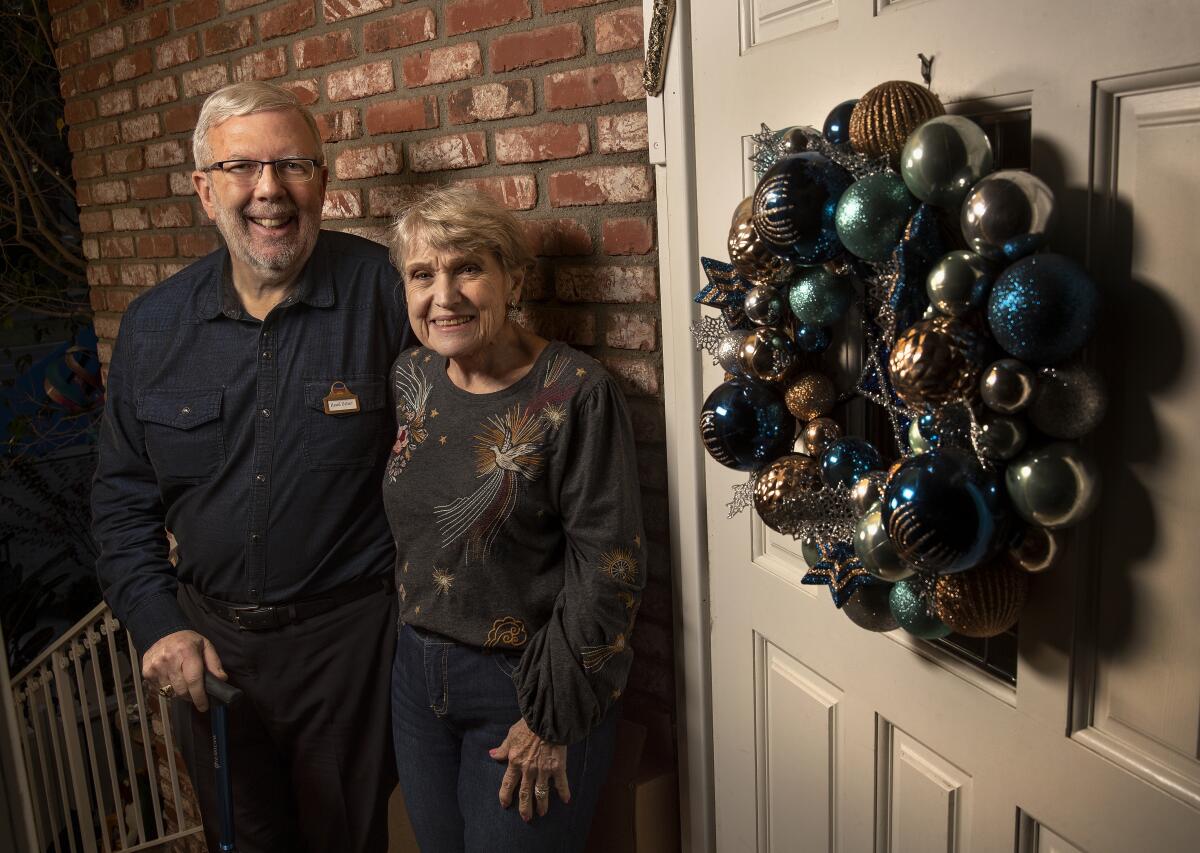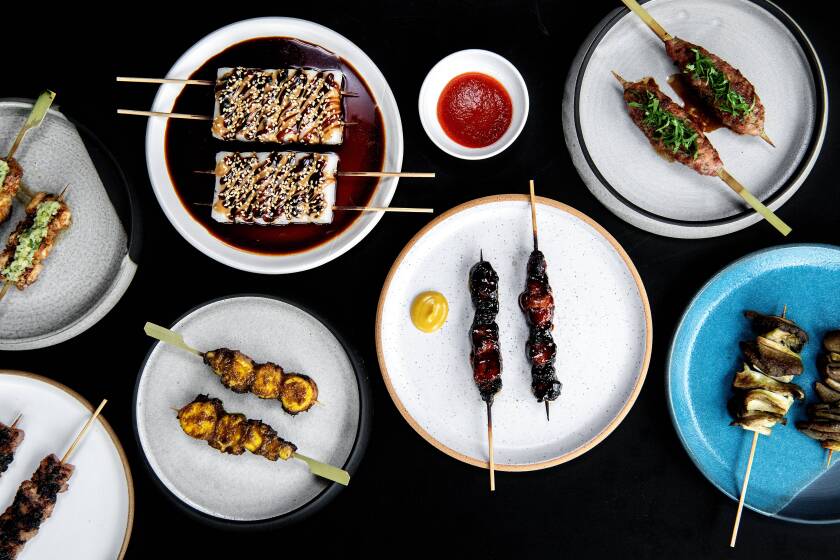A boarded-up Marie Callender’s, a sad movie critic and a ‘bah humbug’ to struggling family dining

- Share via
Alice Maltin got out of her car on Ventura Boulevard in Sherman Oaks with hungry anticipation.
Shocked at her luck in finding a primo parking spot, the septuagenarian took a few steps last month toward one of her favorite places. And froze.
The last Marie Callender’s in the San Fernando Valley — where she had come to get Thanksgiving pies as she did every year — had a thick padlock on the door. Closed for good.
“There were boards in the window, like they didn’t want us sneaking in to get the rest of the pies,” Maltin said.
She peeled out of there. Burst into the home office of her husband, the renowned film critic — and self-described Marie Callender’s “pumpkin pie aficionado” — Leonard Maltin. She dropped the news on him like a big-budget box-office bomb on a desperate Hollywood producer.
“We’re still grieving,” Leonard said, the wound still fresh days later.
“It’s a slice of Americana. When you walk in, you don’t feel like you’re walking into a chain restaurant. It feels homey and you don’t go there to be seen — you go there to get some good, honest food, alongside your neighbors.”

In a world racked by pandemic, political turmoil and natural disasters, this is a tale of heartache over the loss of one of those factories of nostalgia that feel as though they really come alive during the holidays: the family-dining chain restaurant.
They’re where you rack up the calories after your children’s holiday pageants or after looking at Christmas lights, said George Geary, author of “Made in California: The California-Born Burger Joints, Diners, Fast Food & Restaurants That Changed America.”
“They’re celebratory places that are not too expensive and not fast food,” he said. “A notch above Denny’s — nothing against them — with sit-down waitress service.”
But the once-ubiquitous midrange eateries — with table service and long menus of comfort food — started falling out of favor during the Great Recession, when customers deemed them too expensive and began gravitating toward cheaper “fast-casual” restaurants such as Chipotle and Panera Bread. Hundreds of locations have closed down.
The COVID-19 pandemic further devastated eateries that relied primarily on on-site dining. An estimated 90,000 restaurants closed permanently or long term because of the pandemic, said Vanessa Sink, a spokeswoman for the National Restaurant Assn.

Numerous chains — including Ruby Tuesday, Sizzler USA, California Pizza Kitchen and Friendly’s — filed for bankruptcy in 2020. That spring, Cheesecake Factory told landlords it would not be able to pay rent. Big names such as Applebee’s and IHOP, which have the same corporate owner, saw sales tank last year and closed restaurants across the country.
Marie Callender’s, the beloved Southern California-born pie purveyor, has struggled for years. There have been bankruptcies, corporate mergers and splits, and the selling of its trademark to corporate behemoth Conagra Foods, which sells more lucrative frozen meals under the Marie Callender’s name.
In the late 1990s, there were more than 150 Marie Callender’s restaurants. Today, there are 27.
The Sherman Oaks location, which opened in October 1968, closed this fall. The company did not respond to requests for comment.
Marie Callender’s was started in Long Beach in 1948 by the real Marie Callender and her husband and son. They rented a Quonset hut and baked pies all night that they sold to several restaurants, Geary said.
They opened their first restaurant on Tustin Street in Orange in 1964 — with the oven in the window so people could see the pies. Then they quickly expanded.
Geary said he thinks the quality went down when Marie’s son, Don Callender, sold the company in the 1980s and it went corporate.
“I don’t see Marie Callender’s coming back. People don’t eat that way anymore, with those humongous portions,” said Geary, a pastry chef who made the famed cheesecakes for “The Golden Girls” show.
We hope our guide will lead you to some delicious meals.
Marie Callender’s are proudly unhip, with a lot of wood, dark carpeting, antiques and old lamps.
“They never updated their interiors,” Geary said. “They were so old-fashioned, it was like your grandma’s. But grandmothers today aren’t like that. They’re Midcentury Modern; they’re not 1890s.”
Still, the Marie Callender’s name invokes a stubborn loyalty, especially during the holidays.
This Thanksgiving, a woman named Sharon posted a photo of her charred-black frozen pumpkin pie on the company’s Facebook page.
“Thanks Marie Calendar for ruining thanksgiving dessert,” she wrote. The company publicly apologized that the pie “let you down this year.”
The post went viral, and the internet rushed not to Sharon’s defense — but to Marie Callender’s.
“Why are you sorry? ... You didn’t set her oven temperature to the ‘hell’ setting,” one commenter replied.
Another posted a meme of a king and two knights holding swords together in unity. It’s labeled: “Millennials, Boomers, Gen Z: Defending Marie Callender’s From Sharon.”
Even when a standard chain restaurant closes, it can provoke genuinely powerful, bittersweet emotions, said Krystine Batcho, a psychology professor at Le Moyne College in New York and an expert in nostalgia.
Those places become “little anchors to mark our travels together throughout our lives,” places where we laugh, celebrate and mourn together, she said.
“They’re places that are ordinary but special all at the same time. ... When it closes down, especially if it’s in your neighborhood and you drive past it, it’s like this horrible concrete reminder that that part of your life is over.”
The sudden loss of the last Marie Callender’s in the San Fernando Valley — a place synonymous with suburbs, shopping malls and chain stores — hit hard. Even in November 2020, amid the winter COVID-19 surge that marked the darkest days of the pandemic, people donned masks and stood in line outside the Sherman Oaks restaurant for Thanksgiving pie.
On a recent afternoon, the boarded-up restaurant, next to a Party City and a CVS, had a homeless woman sleeping on the patio and a padlock on the door. The empty pie cases can be seen through a small hole in the door; put your nose near it, and the empty eatery smells musty.
A sign on the window reads: “After 53 years in Sherman Oaks our lease has come to an end.” It directs loyalists to the nearest location, in Mar Vista, 11 miles south on the 405 Freeway.
An employee at that location said numerous shellshocked Sherman Oaks regulars traveled “over the hill” — the Santa Monica Mountains — on Thanksgiving Day.
During a recent visit, that restaurant had a Subaru SUV out front with a license plate holder that read: “My Grandkids Are Cuter Than Yours.” Gray-haired lunchgoers had to show proof of COVID-19 vaccination to dine inside and were served food in to-go containers. The dining room was quiet.
Diane Miller, a 77-year-old retiree from Culver City, waited in a purple sweatsuit, Ugg boots and a surgical mask for her weekly takeout order of roast turkey and mashed potatoes, which she splits between two meals. Before the pandemic, she ate there in person, delightedly seeing the same, mostly older, faces.
“Pre-COVID, this restaurant was full,” she said. “I hope they make it through this.”

For Leonard Maltin, the loss of the Sherman Oaks location stings. He said that if he had to write a review of it, it would say: “It may not have been a gourmet’s choice, but it was reliably good and reasonably priced.”
Maltin said he became hooked on Marie Callender’s pie after he and his wife first moved to L.A. from New York 37 years ago, when a friend took them to one after a film screening. The couple lived for years in Toluca Lake, where there was a Marie Callender’s near the Warner Bros. and Universal movie studios. He would get peach and strawberry pies, on “a pie crust laden with whole pieces of fruit.”
Alas, that one closed a decade ago, a travesty Maltin called “the Toluca Lake incident.” It became, of all things, a bank.
When they moved to Sherman Oaks, they were relieved there was a Marie Callender’s nearby.
Maltin — who has been name-dropped in “The Simpsons,” appeared in the movie “Gremlins 2” and was depicted fighting a Godzilla-like giant Barbra Streisand called Mecha-Streisand in “South Park” — said he realizes his love of Marie Callender’s isn’t exactly trendy. But he doesn’t care.
“We kind of pride ourselves on tradition,” he said. “A stubborn adherence to tradition.”
Alice Maltin said the pies had a starring role in the couple’s big, boisterous annual Thanksgiving parties. They would invite all their expat friends with no relatives in California because “so many people need family on this holiday.”
It’s now been two years of small Thanksgiving meals because of the pandemic, but she was hoping to keep the pie tradition alive last month.
Instead, she pulled up to her Marie Callender’s and was stopped cold — as though she got pranked with that classic Hollywood movie standard: the ole pie to the face.
“I wanted those damn pies,” she said, laughing. “Forget about the viruses and the economy. Marie Callender’s is going out of business.”
Times editorial library director Cary Schneider and staff researcher Scott Wilson contributed to this report.
More to Read
Sign up for Essential California
The most important California stories and recommendations in your inbox every morning.
You may occasionally receive promotional content from the Los Angeles Times.












